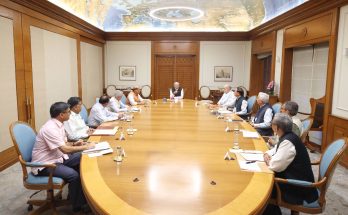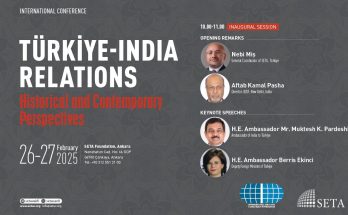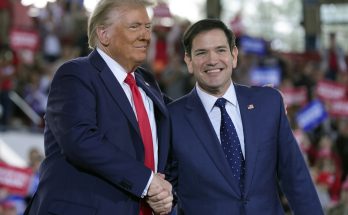
By Vijay Naik
HONOLULU: President of Hawaii’s East-West Center (EWC) Suzanne Vares-Lum is upbeat about the trajectory of the Indo-US relations and the critical role it plays in the Indo-Pacific region. “The Indo-Pacific has assumed strategic importance as it contains 36 nations, 14 time zones, numerous cultures and thousands of languages,” Ms Vares-Lum told India Writes Network in an interview here.
Speaking to this correspondent in her office at the Center, Ms. Vares-Lum spoke on a number of issues including India’s participation in various seminars and programs organized by it from time to time. Among those who addressed seminars include India’s External Affairs Minister S. Jaishankar, his predecessor Sushma Swaraj and Nobel laureate Kailash Satyarthi. Indian industrialist Ratan Tata is a member of the Board of Governors of the Center.
“India matters to Hawaii and the US as we can see from the long-term partnership that has developed over the years,” she added.
Three thousand Indian students have come to the Center in the past 60 years; 44 have participated in various seminars and at present 7 are studying in the graduate degree programs.
Alluding to the joint statement of the foreign ministers of Quad countries, including the US, India, Japan and Australia, she said: “The QUAD is discussing as to how to come together on common issues like Covid-19, maritime awareness, terrorism, trafficking of people, biodiversity, climate change and its impact on the littoral states.’’
She underlined that Covid-19 has brought humanity together in terms of finding solutions to the pandemic. “We have on staff an epidemiologist Dr.Tim Brown who is sharing his research on Covid-19 with various laboratories and medical institutions.”

Ms Vares-Lum is the first woman and the first native Hawaiian to head the East West Center in 60 years of its existence. She assumed charge of her office in January 2022. A former Major General of the US Army, she is an experienced strategic thinker. She praises contributions made by Indian diaspora and those of Indian origin who came from Fiji to the US over a century ago. The East West Center has built a worldwide network of 65,000 alumni and 1100 partner organizations.
South China Sea: “I am not a China expert, but from EWC we go back to values, like freedom, openness, common rules of behavior, we expect one another in a shared space whether that space is in the ocean, air or land or cyberspace. Being transparent and honest in those dialogues is very important.”
Importance of Hawaii: “In 1854 an author described Hawaii as a ‘Sandwich Island.’ He talks about strategic importance and its location. Hawaii is a bridge in the Indo-Pacific region that expands from the coast of California to the West Coast of India. It is a natural place for embracing of nature. There is a special connection to reverence and care for the natural environment that connects us well. It is a natural location for EWC.”
“Headquarters of the United States Indo-Pacific Command are located on this island, which commands and controls over 2,80,000 soldiers, sailors, marines and other personnel that operate within this region, all of it out of Camp H. S. Smith, which is certainly an operating base that maintains peace in the region.”
East-West Center: “It was born out of World War II and the Korean War. Senator Lyndon Johnson advocated for a place where there could be people-to-people dialogue to build understanding. December 2021 was the 80th anniversary of the attack on Pearl Harbor. I think that it was a result of two cultures that did not understand each other and the cost of that was very great. There was a desire amongst leaders in the US Congress to build a place where people could come in a mutual space to talk about issues of common concern.”

“At a young age I used to come to this campus – I could see women in their sarees – you would see multiculturalism. That was the indication of the international flavor of this place. The fact that many of those who came here in 1960s and 70s have gone on to become leaders and continue to contribute in an amazing way, whether it is government leadership, as peace builders, scholars making a positive impact on politics and international relations. For example, at the beginning of the EWC, a female legislator form Republic of Korea who participated in a training program went back with a new vision and changed the legislation that would give women the right to inherit family property.”
Looking ahead, Vares-Lum is confident that the EWC will scale new heights. “In the next ten years, EWC will be the premier institute of the Indo-Pacific region for developing and equipping leaders so that they can solve critical challenges of common concern.” “The Center is a meeting place of many cultures of the region and has contributed to creating leadership, which is engaged in meeting various challenges,” she said.
(Vijay Naik is a senior journalist based in New Delhi.)
Author Profile
- India Writes Network (www.indiawrites.org) is an emerging think tank and a media-publishing company focused on international affairs & the India Story. Centre for Global India Insights is the research arm of India Writes Network. To subscribe to India and the World, write to editor@indiawrites.org. A venture of TGII Media Private Limited, a leading media, publishing and consultancy company, IWN has carved a niche for balanced and exhaustive reporting and analysis of international affairs. Eminent personalities, politicians, diplomats, authors, strategy gurus and news-makers have contributed to India Writes Network, as also “India and the World,” a magazine focused on global affairs.
Latest entries
 India and the WorldJune 26, 2025Operation Sindoor: India Sheds Restraint, Rediscovers Utility of Force
India and the WorldJune 26, 2025Operation Sindoor: India Sheds Restraint, Rediscovers Utility of Force India and the WorldJune 23, 2025BRICS summit in Rio to focus on Global South, local currency trade
India and the WorldJune 23, 2025BRICS summit in Rio to focus on Global South, local currency trade Africa InsightsJune 11, 2025New Opportunities in India-Japan Cooperation in Africa
Africa InsightsJune 11, 2025New Opportunities in India-Japan Cooperation in Africa India and the WorldMay 23, 2025Post-Operation Sindoor, India reminds Turkey, China of concerns and sensitivities
India and the WorldMay 23, 2025Post-Operation Sindoor, India reminds Turkey, China of concerns and sensitivities







